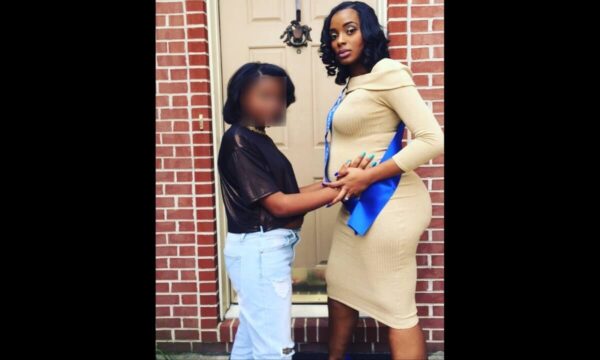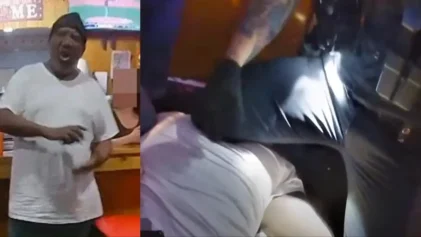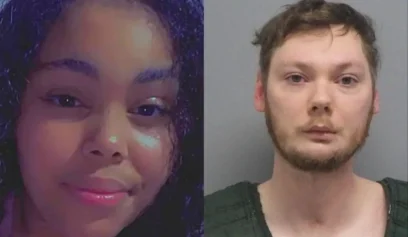Lakeeta B., a mother of two kids living in Washington, D.C., said she began noticing a change in her outgoing daughter’s interests and demeanor when she was around 14 years old. Her daughter was a cheerleader, a gymnast and “a really, really good kid,” she told Atlanta Black Star.
But Lakeeta’s daughter soon became someone she didn’t recognize. “I didn’t know this kid. I was like, ‘who’s this kid?’ You know what I mean?” she said.
The concerned parent believes the popular social media app TikTok played a huge part in her daughter’s decline.
“As they get older, they kind of start settling into their own personalities and things of that nature,” Lakeeta said. Her daughter, who once aspired to be a fashion designer, began spending more time in her room scrolling on the app.

“I didn’t realize that it happened to be TikTok until I had a family member send me a post which [my daughter] had posted and it was very, very dark,” she said.
The post suggested her daughter was having suicidal thoughts, according to Lakeeta. The mother said her child also posted images of marijuana.
“Typically if you’re living in a house with someone and this is a child, you think that you’re as tuned in as you possibly can, but then you learn that the outside world has a bigger influence on children and more pressure that we care to admit,” she said.
How TikTok impacts children’s health
Kelvin Goode, the founder of consumer justice platform ClaimsHero, says what makes TikTok particularly harmful is the lack of control young people have over what appears on their feed.
“If you’re on Instagram, you’re usually seeing content from people that you actually follow,” Goode, whose platform is helping thousands of families take legal action against TikTok, told Atlanta Black Star.
“TikTok pumps content out to anyone,” he said, also noting that the app has design defects that internal documents have shown the company is aware of.
“They basically still pump it out to the kids,” Goode said. “Some of these defects they know cause compulsive use, like the endless feeds, the notifications late at night.”
Several studies have linked TikTok usage to higher risks of depression, body dysmorphia, self-harm and eating disorders, especially among teens, according to ClaimsHero.
A recent United States Surgeon General report also outlines some of the growing concerns about how social media affects the mental health of youth.
TikTok did not respond to a request for comment.
The company states on its Safety page, “We do not allow content depicting, promoting, normalizing or glorifying activities that could lead to suicide or self-harm.”
TikTok, which describes itself as a “a positive and supportive community,” says the platform doesn’t allow users to share content depicting them partaking in or encouraging others to partake in “dangerous activities that may lead to serious injury or death,” according to its website.
“We will not show self-harm related content when searching related terms,” the company states online, adding that it wants to support users by providing resources and access to emotional support helplines, including suicide prevention hotlines.
TikTok’s team also says it works with emotional health experts “to continually improve our policies and approach,” and will intervene if there’s a user who may be at risk of self-harm.
States and school districts take legal action
Lakeeta learned her child was not alone in suffering mental health impacts linked to using TikTok.
The social media platform owned by Chinese company Bytedance and launched in 2016, has been embroiled in controversy in recent years related to its reported impacts on the mental health of children and teens.
A 2022 report from the Center for Countering Digital Hate found that among some of the harmful content hosted on the app, “TikTok recommended eating disorder and self-harm content to new teen accounts” within minutes of scrolling the the app’s For You page, according to the nonprofit.
The report revealed that content with themes of suicide were recommended to users within 2.6 minutes of scrolling the app used by two-thirds of American teens for an average of 80 minutes a day.
TikTok has been the target of lawsuits and legal action, including a nationwide investigation launched by attorneys general from 46 states including California, Florida and New Jersey into the app’s effects on youth’s mental health, The Associated Press reported.
The multistate lawsuit alleges that TikTok is “violating state consumer protection laws in ways that have fueled the ongoing crisis in the mental health of children and teens.”
Illinois Attorney General Kwame Raoul said in a statement in 2022, when his state joined the ongoing investigation, the probe “seeks to determine what methods TikTok is using to increase the time users spend on the platform, and how that increased time harms young users’ physical and mental health.”
At least 600 school districts, including some in Tennessee, Arizona and Colorado, have also launched lawsuits against TikTok, citing mental health impacts on children.
A school board in North Carolina voted on Tuesday to join a federal class-action suit against the app that also sues the owners of Facebook, Instagram, TikTok, Snapchat and YouTube, the News & Observer reported.
New York City Mayor Eric Adams announced on Feb. 14 that his administration also filed a 311-page lawsuit against the companies for similar reasons. Because TikTok changed its terms of service last July, Goode says time is running out for parents to seek justice.
Parents are fighting back against TikTok
Goode told Atlanta Black Star that TikTok added a one-year statute of limitation to its terms. “Parents only have a couple of months left before their claims are forever extinguished,” Goode said. “They can’t bring claims after July 2024, so we’re encouraging families, like I’m trying to scream at the top of every building to just sign up, share your story and see if you do have a claim.”
His company identifies consumer harm and raises awareness for those harms to make it easier for consumers like Lakeeta B. to speak up. She is among more than 5,000 seeking help from ClaimsHero to pursue legal action against TikTok.
Lakeeta, who says her now-17-year daughter has since drastically improved mentally following therapy and is on track to graduate early, said a friend told her about the platform.
“They definitely are doing the correct thing by just trying to get these people to take accountability,” she said. “And parents have gotta step up and say, ‘OK, yep, we see what you’re doing to our youth, and we’re no longer accepting it.’”
Erika Bent, a San Francisco psychotherapist specializing in working with kids and teens, recommends that families noticing their child struggling as a result of TikTok usage monitor what their kids are seeing on social media so they can step in if needed. She also suggested having open conversations with kids.
“Not in a judgmental way of, ‘you don’t seem to be doing well, so I’m going to take away your social media,’ because I think that can actually create more suffering, isn’t helpful necessarily and can have more of a punishing element to it,” Bent told Atlanta Black Star.
“I think more importantly, parents should come forward with, ‘I’ve noticed that you seem to be spending less time with your friends, or you haven’t been having dinner with the family lately – can we talk about it?’” Bent recommended.


